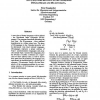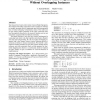458 search results - page 27 / 92 » A Dependently Typed Assembly Language |
BMCBI
2008
13 years 7 months ago
2008
Background: Genes interact with each other as basic building blocks of life, forming a complicated network. The relationship between groups of genes with different functions can b...
ATAL
2009
Springer
13 years 8 months ago
2009
Springer
In this paper we present a new model for the requirements analysis of a system. We offer a conceptual model defined following a visual modeling language, called dependence networks...
POPL
1989
ACM
13 years 11 months ago
1989
ACM
raction that a programming language provides influences the structure and algorithmic complexity of the resulting programs: just imagine creating an artificial intelligence engine ...
EACL
1993
ACL Anthology
13 years 9 months ago
1993
ACL Anthology
A new class of formal languages will be defined the Distributed Index Languages (DI-languages). The grammar-formalism generating the new class - the DI-grammars - cover unbound de...
ICFP
2010
ACM
13 years 8 months ago
2010
ACM
Type classes have found a wide variety of uses in Haskell programs, from simple overloading of operators (such as equality or ordering) to complex invariants used to implement typ...


